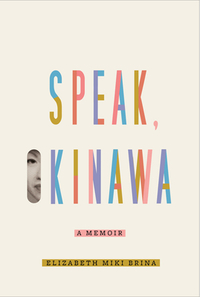Take a photo of a barcode or cover
emotional
reflective
medium-paced
emotional
informative
reflective
medium-paced
challenging
emotional
informative
reflective
sad
Graphic: Rape, Sexual assault
Moderate: Xenophobia
This heartfelt memoir details the author's self-exploration as the chid of an Okinwan mother and American father. Born in Okinawa, young Elizabeth and her mother come to the US to join her father, who she doesn't remember, but who soon becomes her preferred parent. A former US soldier who met her mother while on R&R in Okinawa, he is a politically conservative, rugged individualist who holds much influence over Elizabeth. Her mother, Kyoko, lives a sorrowful life in the US, drowning her emotions in alcohol and trying to take care of her family. Their marriage lasts, but how and why is a puzzle to Elizabeth.
Elizabeth spends most of her youth and early adult years embarrassed by and resentful of her mother. She finds it shameful that her mother cannot pronounce her name, and is further mortified by her mother's attempts to speak in public; in fact, she is mortified by her mother's attempt to just exist. Elizabeth is cruel to her, and admits that the linguistic and cultural barriers create confusion in her trying to communicate with her. Elizabeth feels "too American" but is unapologetically disinterested in her family in Okinawa or her Okinawan roots, and disinterested, too, in learning Japanese or her mother's native Okinawan language.
As Elizabeth reaches adulthood, she looks inward in an attempt to "explain myself to myself." She travels to Okinawa several times, (willingly, as in the past the trips had been forced on her), and she comes to find herself as a true Okinawan who has been drastically affected the intergenerational trauma that Okinawans have suffered at the hands of the Chinese, Japanese and Americans. Indeed, what is possibly the most poignant aspect of the book is the author's detailed account of Okinawa's tragic history, which she narrates as an Okinawan, using the pronoun "we." For me, this history was eye-opening and caused me deep remorse as a US born person. At the end of the book, Elizabeth implores the US government to free Okinawa and to make reparations. She also offers an apology to her mother and to her people, which she contextualizes in the Japanese custom of expressing apology in so many different ways, for so many reasons.
The author has an interesting style - her sentences are short and often repetitive. I listened to the book which is read by a fantastic narrator. Highly recommend!
Elizabeth spends most of her youth and early adult years embarrassed by and resentful of her mother. She finds it shameful that her mother cannot pronounce her name, and is further mortified by her mother's attempts to speak in public; in fact, she is mortified by her mother's attempt to just exist. Elizabeth is cruel to her, and admits that the linguistic and cultural barriers create confusion in her trying to communicate with her. Elizabeth feels "too American" but is unapologetically disinterested in her family in Okinawa or her Okinawan roots, and disinterested, too, in learning Japanese or her mother's native Okinawan language.
As Elizabeth reaches adulthood, she looks inward in an attempt to "explain myself to myself." She travels to Okinawa several times, (willingly, as in the past the trips had been forced on her), and she comes to find herself as a true Okinawan who has been drastically affected the intergenerational trauma that Okinawans have suffered at the hands of the Chinese, Japanese and Americans. Indeed, what is possibly the most poignant aspect of the book is the author's detailed account of Okinawa's tragic history, which she narrates as an Okinawan, using the pronoun "we." For me, this history was eye-opening and caused me deep remorse as a US born person. At the end of the book, Elizabeth implores the US government to free Okinawa and to make reparations. She also offers an apology to her mother and to her people, which she contextualizes in the Japanese custom of expressing apology in so many different ways, for so many reasons.
The author has an interesting style - her sentences are short and often repetitive. I listened to the book which is read by a fantastic narrator. Highly recommend!
emotional
hopeful
reflective
sad
medium-paced
I basically cried the entire time.
emotional
informative
inspiring
reflective
sad
medium-paced
emotional
informative
sad
emotional
informative
reflective
medium-paced
I don’t understand the hype on this one. This just seemed to be about a girl who was ashamed of her own mother. This was a DNF for me.






